There are some traditions that have not gotten lost in time and are still respected. Every country and culture is different from one another, and India is a great example of this. People behave, eat, and even dress differently. They have their own traditions and customs, and as tourists, these need to be honored. And this is exactly what we’d like to bring forth in this article.
We at Bright Side have been mesmerized by the uniqueness of Indian culture, so we’d like to share with you a few useful tips to make the most out of your trip.
1. You must not touch books or instruments with your feet.
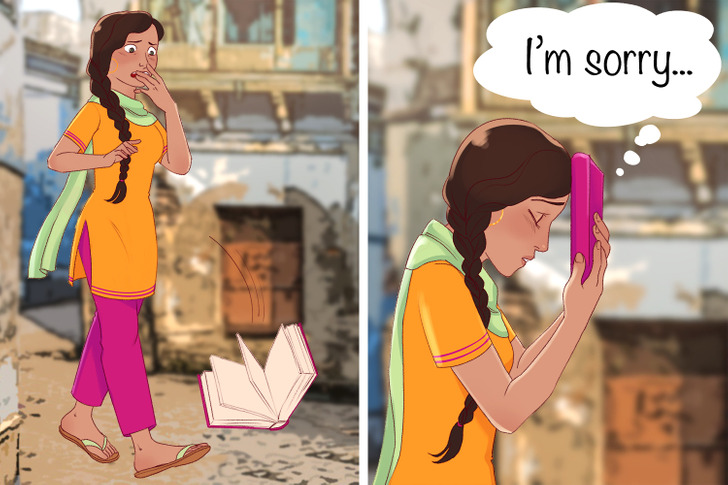
In India, children are taught from a young age that books are knowledge. They even have a Goddess of Learning, Saraswati. Therefore, touching books with one’s feet or even kicking a school bag full of notebooks or books is considered disrespectful.
Any instrument that is used to develop one’s knowledge is also considered very important and must not be touched by the feet. Even pens and pencils are important, according to Indian culture, and must be respected as such.
2. Don’t be afraid to explore Indian street food.
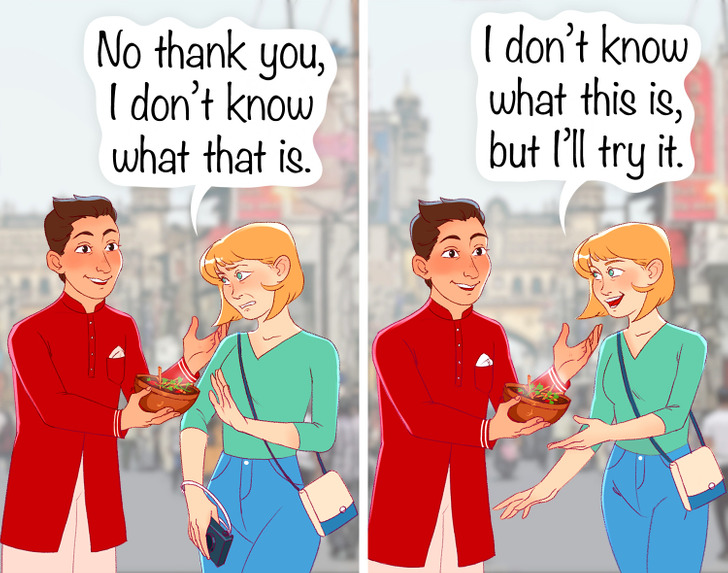
Exploring foreign cuisine is generally very important when visiting other countries, and sometimes the best food around is the kind made at that small corner vendor. And Indian food is no exception, as it’s one of the richest cuisines out there. It’s a must-try for sure. Just watch out for that extra-spicy food!
As with any street food experience, you must be careful. Seek fresh food, avoid milk products as they can sometimes be spoiled, avoid ice or water that was not heated well (definitely try to avoid tap water), and generally look forward to trying clean (and busy) vendors.
3. Don’t be too polite.
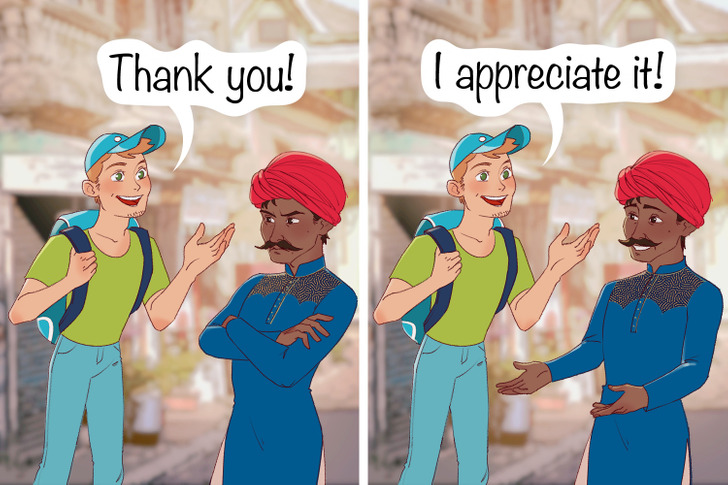
Saying “please” and “thank you” is normal and respectful for us, like at a restaurant or a shop. However, in India, when used too much, you can come across as rude or impolite. Who would’ve thought, right?
When it comes to friends and family, traditional ways of showing appreciation can sometimes create tension or express a level of formality that should not exist. Instead of saying “thank you,” you can try saying “I appreciate it.”
4. Only use your right hand when giving or taking anything.
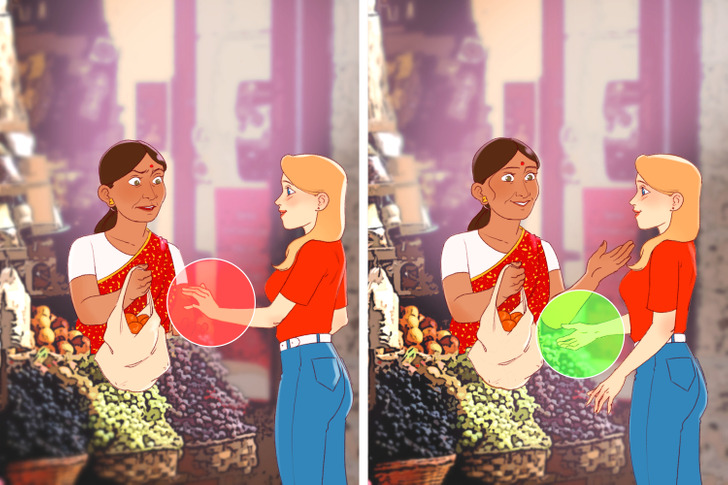
Many cultures have actually adopted this practice. In many cultures, the right hand is considered pure and even lucky! In India, it is believed that the left hand is impure, as it is used for cleaning shoes, feet, and generally dirty work. So when it comes to food, drinks, and handing objects to other people, we must always use the right hand to show respect.
5. Do not point your finger.
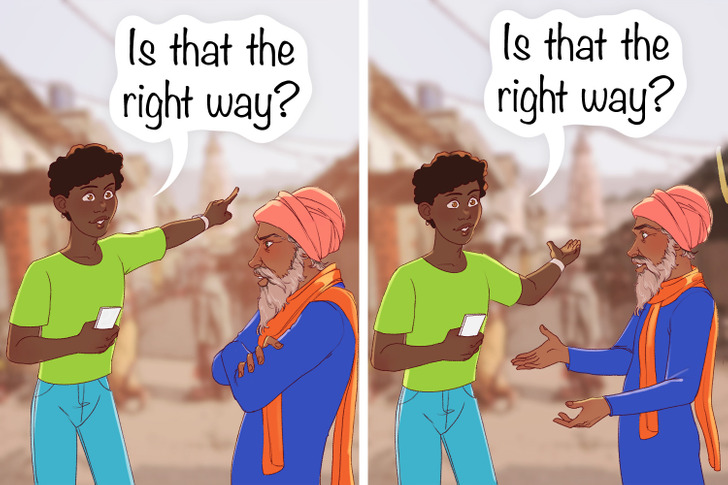
Usually, we use our pointer finger to give directions at a restaurant or generally when referring to something in particular. But this is definitely not the case in India.
Pointing your finger at an object or place is considered rude and impolite. If you wish to give directions or point out something to someone, you must do so by using your whole palm or your thumb. This way, it’s more gentle and polite.
6. Expect to use cash only.
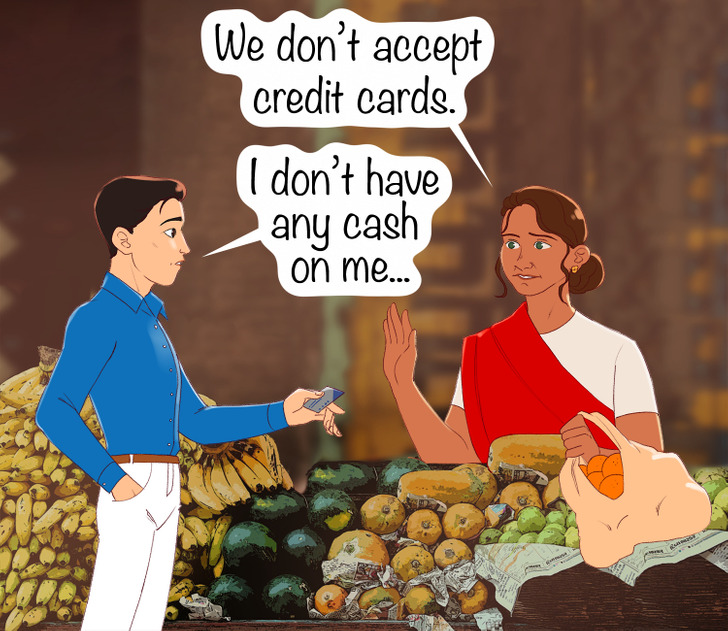
If you’re visiting a small town in India, you should expect to pay with cash most of the time. While in the bigger cities, malls, restaurants, and shops, credit or debit cards may be accepted, they are still rare, and the smaller cities make use of cash. So it would be smart to keep some cash with you, just in case.
7. Not everyone is going to speak English.
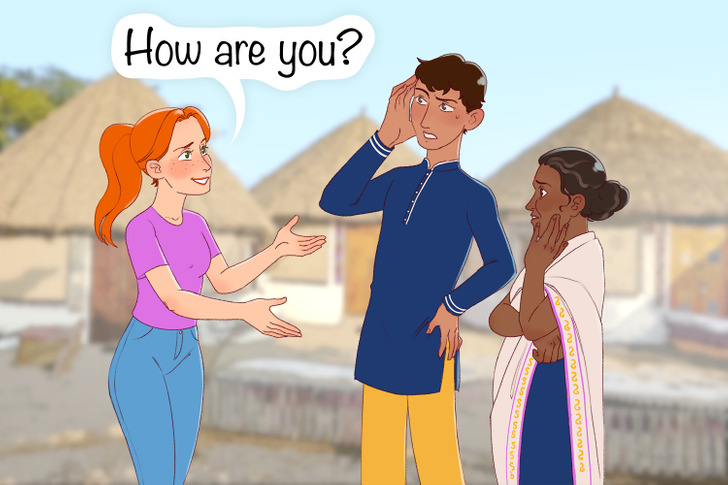
Of course, you might be lucky enough to be able to use English inside bigger cities, restaurants, hotels, or certain shops, however, this is not the case for smaller villages. Here, you should expect people to use their native language, which is not necessarily a bad thing.
Spending time among foreign people and hearing their native language might actually do you some good. You can pick up a new language, getting to know a new culture.
8. Learn about and use traditional greetings.
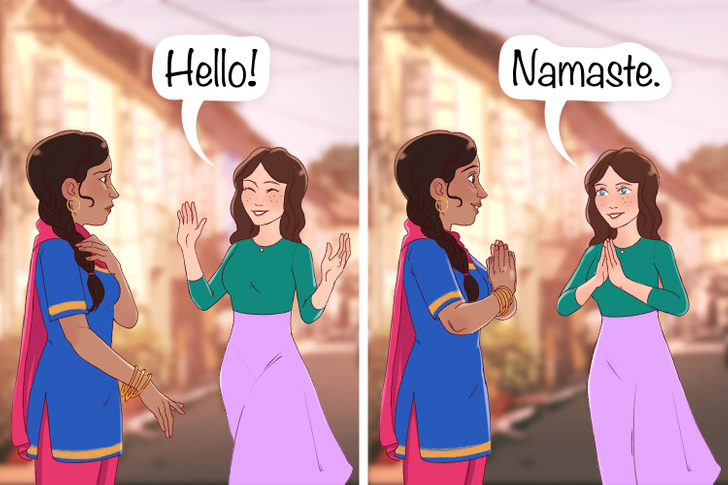
Respect is required everywhere you go in the world, and India is no exception. You can show your respect for the country and its people by learning about their culture and traditional greetings. One such greeting that is used in a general manner is “namaste.” You can put your palms together and bow to show respect while saying namaste, or, if you’d like to be more formal, you can use “namaskar.”
As English has become more globalized, “hello’’ is also used, especially among tourists and foreigners. Just know that “goodbye” is usually not used, as it implies you won’t be seeing each other anymore, or that you are asking for permission to leave.
9. Don’t use public displays of affection.
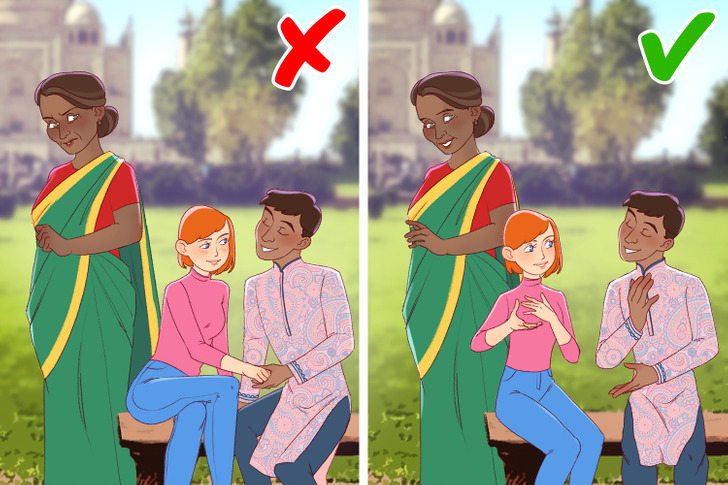
Public display of affection is generally looked down upon as it is quite a private thing. However, in India, you must not show affection in public. When you visit a new or foreign country, you might want to blend in with other people so as to not get unwanted stares. This is one of those things you must do.
Try and avoid holding hands or using overly affectionate gestures in public, as it is frowned upon. You can even spend time in jail!
10. Know that in small towns, you must wear decent clothes.
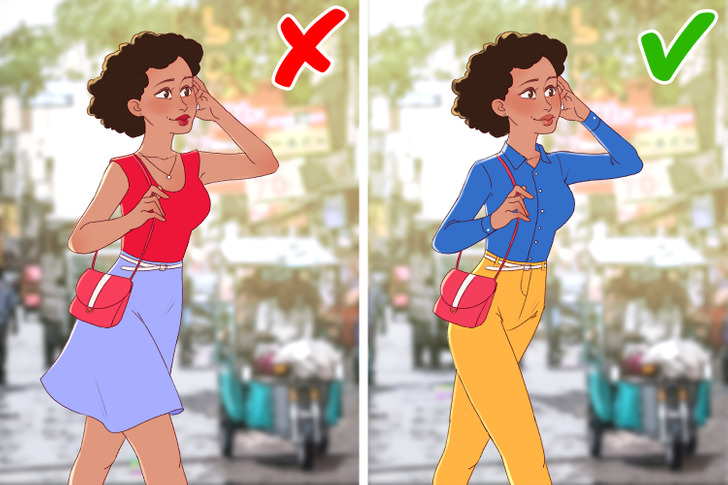
One of the most important things to keep in mind when coming to India is the way you present yourself. As a quite conservative country, it’s good to respect its culture and people, and you can start with your clothes. Even if it’s hot outside, try and cover yourself. This way, you can pay your respects to the country, and also make yourself look like a local.
If you’re visiting a particular attraction, it’s important to wrap a scarf around your head to show respect and politeness.
Have you ever traveled to India? Which aspect of Indian culture intrigues you the most?
My Neighbor Doused My Car With Water In Freezing Weather – He Regretted It That Same Night

When my wealthy neighbor deemed my cherished old sedan an “eyesore,” he took matters into his own hands and froze my car solid overnight. But that same night, karma taught him a harsh lesson.
I never thought I’d end up in a neighborhood where every driveway sports at least one shiny German import and landscapers show up like clockwork every Thursday morning.

Houses in a nice neighborhood | Source: Midjourney
But here I was, thanks to my company’s corporate housing program, feeling like the poster child for imposter syndrome with my dad’s beat-up 1989 sedan.
That car was everything to me. Every ding and scratch told a story, like the small dent in the rear bumper from when Dad taught me to parallel park, or the tiny crack in the dashboard where he used to tap his fingers along to Johnny Cash.
After Dad passed, keeping that car running became my way of keeping his memory alive.

An old sedan | Source: Pexels
I was out there one crisp fall morning, giving the old girl her weekly wash, when I heard the crunch of expensive shoes on fallen leaves.
“Excuse me, miss” The voice dripped with the kind of entitled condescension you can only perfect through years of country club memberships.
I turned around, soap suds dripping from my hands, to find my neighbor Tom, looking like he’d just stepped out of a catalog for overpriced golf wear. His perfectly styled hair didn’t move an inch in the morning breeze.
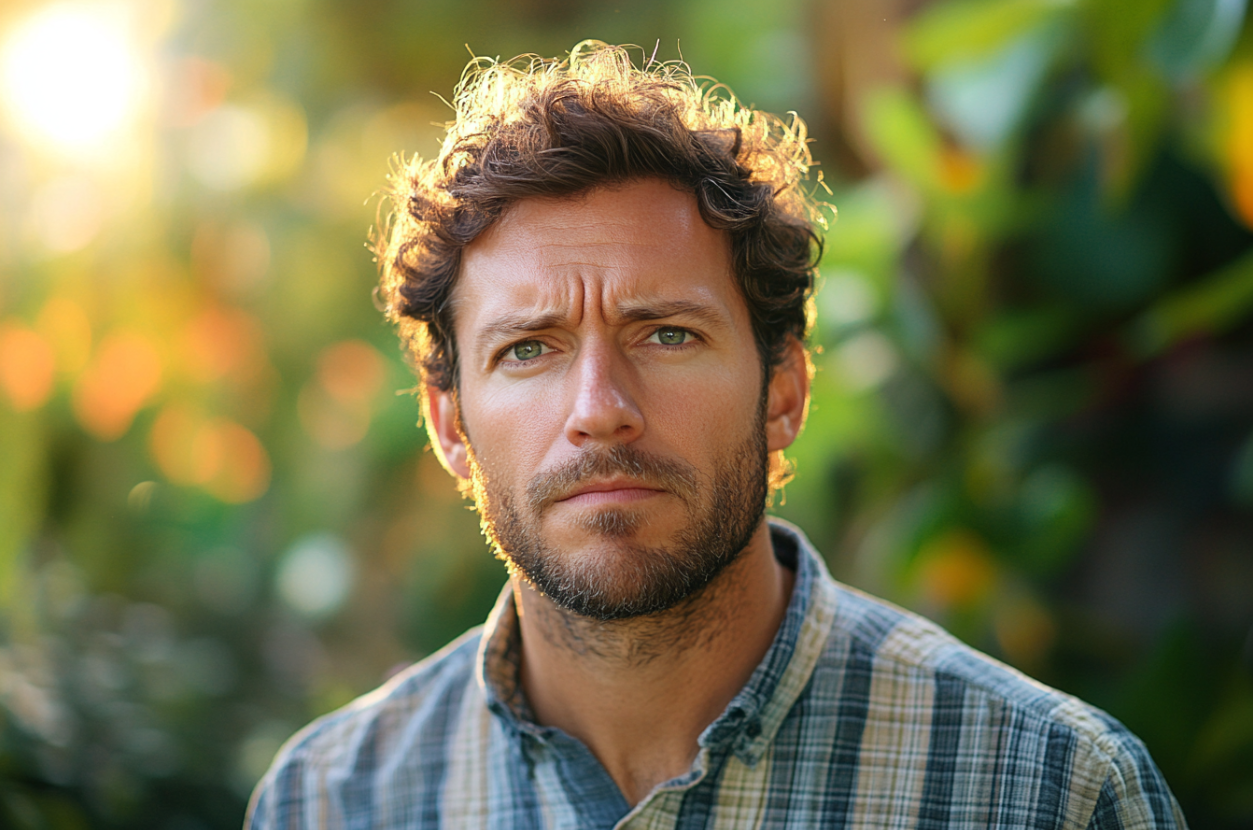
A man with a stern expression | Source: Midjourney
“You can call me Lila.” I kept scrubbing at a particularly stubborn bird dropping.
“Right.” His jaw tightened slightly. “Look, I need to talk to you about this…” He gestured at my car with obvious distaste, his signet ring catching the morning light. “This vehicle situation.”
I straightened up, crossing my arms. “Vehicle situation?”
“It’s an eyesore.” He didn’t even try to soften the blow.

A man pointing his finger | Source: Midjourney
“People move to this neighborhood for a certain… aesthetic and quality of life. And your car, well, it’s destroying property values. Not to mention the environmental impact — do you have any idea what kind of pollutants that ancient engine is spewing? My children play outside!”
I couldn’t help but laugh. The sound echoed off the perfectly maintained facades of our matching houses.
“Your kids play outside? Since when? The only time I see them is when they’re being shuttled between your house and your massive SUV. Which, by the way, probably burns more fuel in a week than my car does in a month.”

A woman talking to someone | Source: Midjourney
His face reddened, the color creeping up from his starched collar. “That’s not the point. The point is that you need to get rid of this junk heap. It doesn’t belong here, and frankly—” he lowered his voice conspiratorially, “—neither do you.”
“Oh, really?” I cocked my head, feeling my father’s stubborn streak rising in me. The same stubbornness that had helped him build his auto repair shop from nothing. “Are you offering to buy me a new car?”
“Of course not, but if you don’t get rid of it within a week,” he said, jaw clenched, “I’ll make sure you have to replace it. This isn’t the kind of neighborhood where we tolerate… diminishing standards.”

An angry man | Source: Midjourney
I waved my soapy sponge at him, sending a spray of bubbles his way. He jumped back like I’d thrown acid. “Was that a threat, Tom? Because it sounded an awful lot like a threat.”
He turned on his heel and stalked away, leaving me wondering what kind of person actually talks like that in real life.
I finished washing my old car and went inside. I didn’t think much about the conversation until a week later when I found out exactly what kind of person Tom was.

A surprised woman | Source: Midjourney
The morning air bit at my face as I stepped outside, travel mug of coffee in hand, ready for work. The sunrise was painting the sky in shades of pink and gold, but I stopped dead in my tracks, nearly dropping my coffee.
My car was completely encased in ice; thick, clear ice that looked nothing like natural frost.
It was as if someone had spent hours spraying it with a hose in the freezing night air.

A car covered in ice | Source: Midjourney
The morning light refracted through the frozen shell, creating tiny rainbows that would have been beautiful if they weren’t so infuriating.
“Careful,” came Tom’s voice from his porch next door. He was lounging in an Adirondack chair, sipping his morning coffee with a smile that made me want to throw something. His breath made little clouds in the cold air. “Looks like it’s raining every night! Hope you’ve got a good scraper.”
I stormed over to his porch, my boots leaving angry prints on his perfect lawn. “Are you serious right now? This is how you handle things? What are you, twelve?”

A woman gesturing to her frozen car | Source: Midjourney
“I’m sure I don’t know what you mean.” His smug smile never wavered. “Mother Nature can be so unpredictable. Especially in this neighborhood.”
“Mother Nature doesn’t target single cars, Tom.” My hands were shaking with anger. “This is harassment. And pretty childish harassment at that.”
“Prove it.” He took another sip of coffee, the steam curling around his face like a villain’s smokescreen. “Or better yet, take the hint and get rid of that heap, or move. I’m sure there’s a nice apartment complex somewhere that would be more… suitable for your situation.”

A smirking man | Source: Midjourney
I spent the next three hours chipping away at the ice, my hands going numb despite my gloves. The whole time, I plotted elaborate revenge scenarios, each more ridiculous than the last.
But Dad’s voice echoed in my memory: “The best revenge is living well, kiddo. And keeping your hands clean means you never have to look over your shoulder.”
That night, a strange whooshing sound jolted me awake. At first, I thought it was just the wind, but there was something different about it, something almost musical… like water.

A woman in bed | Source: Pexels
I rushed to my window, half-expecting to catch Tom creating another ice sculpture out of my car. Instead, I burst out laughing.
A fire hydrant at the edge of Tom’s property had exploded, sending a powerful jet of water directly at his house. In the freezing night air, the water was turning to ice on contact, slowly encasing his perfect home and his precious German SUV in a thick crystal shell.
The streetlights caught each frozen droplet, turning his property into a bizarre winter wonderland.

Water spraying from a damaged fire hydrant | Source: Midjourney
By morning, half the neighborhood had gathered to gawk at the spectacle. Some were taking photos with their phones, others whispering behind their hands.
Tom stood in his driveway, attacking the ice with a tiny garden shovel, looking absolutely miserable in his designer winter coat. His perfectly styled hair was finally out of place, plastered to his forehead with sweat despite the cold.
I watched him struggle for a few minutes before sighing heavily. Dad would’ve known what to do.

A woman with a resigned look on her face | Source: Midjourney
He always said that kindness costs nothing but means everything. I grabbed my heavy-duty ice scraper and walked over.
“Want some help?” I asked, trying not to sound too amused. “I’ve got some experience with this sort of thing.”
Tom looked up, surprised and suspicious. His face was red from exertion, his breath coming in short puffs. “Why would you help me? After everything?”
I shrugged and started scraping. “Guess I’m just a better neighbor than you.”

A woman holding an ice scraper | Source: Midjourney
We worked in silence for hours, gradually freeing his car and clearing a path to his front door. By the time we finished, the sun was setting, and we were both exhausted.
The next morning, there was a knock at my door. Tom stood there, shifting his weight from foot to foot, making his expensive shoes creak.
“I owe you an apology,” he said. “I was a jerk. You didn’t have to help me yesterday, but you did.” He thrust an envelope at me. “This is to thank you… and to make amends.”

A woman holding an envelope | Source: Pexels
Inside was $5,000 in hundred-dollar bills. I stared at it, then at him, the paper crisp between my fingers.
“It’s for your car,” he explained quickly. “Get it fixed up — or get a new one if you’d prefer. Consider it a peace offering. And… I’m sorry about what I said. About you not belonging here.”
I looked at the money, then at my dad’s old sedan sitting in the driveway.
“Thanks, Tom,” I said, tucking the envelope into my pocket. “I think I know exactly what I’m going to do with this.”

A woman with her hand in her pocket | Source: Midjourney
A week later, my old sedan was sporting a fresh coat of paint, new tires, and a completely rebuilt engine. It stood out even more now as a perfectly restored classic in a sea of modern luxury vehicles.
Every time I caught Tom looking at it, I made sure to rev the engine extra loud. Sometimes he’d even give me a grudging nod of appreciation.
Sometimes the best revenge isn’t revenge at all.

A woman driving a classic car | Source: Pexels
Dad always said that class isn’t about what you own — it’s about how you treat people, even the ones who don’t deserve it.
Here’s another story: When sleep-deprived mom Genevieve discovers her car covered in eggs, she thinks it’s a prank — until her smug neighbor Brad admits he did it because her car was ruining the view of his elaborate Halloween display. Furious but too exhausted to argue, Genevieve vows to teach him a lesson.
This work is inspired by real events and people, but it has been fictionalized for creative purposes. Names, characters, and details have been changed to protect privacy and enhance the narrative. Any resemblance to actual persons, living or dead, or actual events is purely coincidental and not intended by the author.
The author and publisher make no claims to the accuracy of events or the portrayal of characters and are not liable for any misinterpretation. This story is provided “as is,” and any opinions expressed are those of the characters and do not reflect the views of the author or publisher.



Leave a Reply